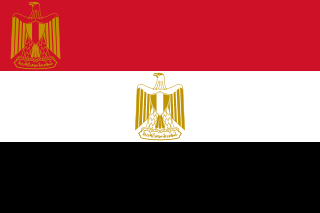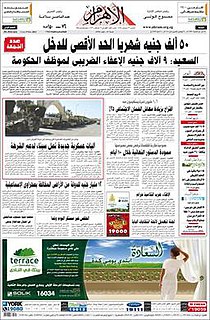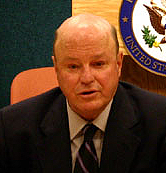
The President of the Arab Republic of Egypt is the head of state of Egypt. Under the various iterations of the Constitution of Egypt, the president is also the Supreme Commander of the Armed Forces and head of the executive branch of the Egyptian government. The current president is Abdel Fattah el-Sisi, in office since 8 June 2014.

Al-Ahram, founded on 5 August 1875, is the most widely circulating Egyptian daily newspaper, and the second oldest after al-Waqa'i`al-Masriya. It is majority owned by the Egyptian government.

Gamal Al Din Mohammed Hosni Ei Sayed Mubarak, , is the younger of the two sons of former Egyptian President Hosni Mubarak and former First Lady Suzanne Mubarak. In contrast to his older brother Alaa, Gamal had pursued an active public profile and was starting to wield some influence on political life in the country before the revolution of early 2011.
Alaa Mubarak is an Egyptian businessman and the elder of two sons of Hosni Mubarak, the former President of Egypt who served from 1981 to 2011, and his wife Suzanne Mubarak.

The National Democratic Party, often simply called in Arabic: الحزب الوطني Al-Ḥizb al-Waṭaniy – the "National Party", was an Egyptian political party. It was founded by President Anwar El Sadat in 1978.

Suzanne Mubarak is the wife of former Egyptian President Hosni Mubarak and was the First Lady of Egypt during her husband's presidential tenure from 14 October 1981 to 11 February 2011. She has served as Goodwill Ambassador of the United Nations Food and Agriculture Organization, and founded the Cairo Child Museum in collaboration with the British Museum. Born to an Egyptian father and a British mother, she is a sociologist by education.

Mohamed Hussein Tantawy Soliman is an Egyptian field marshal and former politician. He was the commander-in-chief of the Egyptian Armed Forces and, as Chairman of the Supreme Council of the Armed Forces, was the de facto head of state from the ousting of Hosni Mubarak on 11 February 2011 to the inauguration of Mohamed Morsi as President of Egypt on 30 June 2012. Tantawy served in the government as Minister of Defense and Military Production from 1991 until Morsi ordered Tantawy to retire on 12 August 2012.
Habib Ibrahim El-Adly is a former Egyptian politician. He served as interior minister of Egypt from November 1997 to January 2011. He was the longest serving interior minister under President Hosni Mubarak.

Ahmed Mohamed Shafik Zaki is an Egyptian politician and a former candidate for the presidency of Egypt. He was a senior commander in the Egyptian Air Force and later served as Prime Minister of Egypt from 29 January 2011 to 3 March 2011.

Frank George Wisner II is an American businessman and former diplomat. He is the son of CIA official Frank Wisner (1909–1965). On January 31, 2011, he was sent to Egypt by President Barack Obama to negotiate a resolution to the popular protests against the regime that had swept the country. A White House spokesman said that Wisner had vast experience in the region as well as close relationships with many Egyptians in and out of government. The New York Times reports that he is a personal friend of Egyptian president Hosni Mubarak. Speaking on the BBC on February 5, 2011, he exceeded statements issued by the White House to date and insisted that President Mubarak should be allowed to remain in office despite widespread calls for him to step down.

Omar Mahmoud Suleiman was an Egyptian army general, politician, diplomat, and intelligence officer. A leading figure in Egypt's intelligence system beginning in 1986, Suleiman was appointed to the long-vacant Vice Presidency by President Hosni Mubarak on 29 January 2011. On 11 February 2011, Suleiman announced Mubarak's resignation and ceased being Vice President; governing power was transferred to the Armed Forces Supreme Council, of which Suleiman was not a member. A new head of intelligence services was appointed by the ruling Supreme Council. Suleiman withdrew from the political scene and did not appear in public after announcing Mubarak's resignation.

Khaldoon Khalifa Al Mubarak is an Emirati entrepreneur and the chief executive officer and managing director of Mubadala Development Company.

Denmark–Egypt relations are foreign relations between Denmark and Egypt. Denmark has an embassy in Cairo, and consulates in Suez, Port Said and Cairo. Egypt has an embassy in Copenhagen. Both countries are members of the Union for the Mediterranean.

A referendum on the candidacy of Hosni Mubarak for the post of President was held in Egypt on 5 October 1987. Mubarak had been nominated by the two-thirds required in the People's Assembly on 5 July. His candidacy was approved by 97.1% of votes cast, with an 88.5% turnout.

A referendum on Hosni Mubarak's candidacy for President was held in Egypt on 4 October 1993, after he was nominated for the post by a 439-9 vote in the People's Assembly on 21 July. Mubarak's candidacy for a third consecutive six-year term was approved by 96.3% of voters, with a turnout of 84.2%.

The Egyptian revolution of 2011, also known as the January 25 Revolution It started on 25 January 2011 and spread across Egypt. The date was set by various youth groups to coincide with the annual Egyptian "Police holiday" as a statement against increasing police brutality during the last few years of Mubarak's presidency. It consisted of demonstrations, marches, occupations of plazas, non-violent civil resistance, acts of civil disobedience and strikes. Millions of protesters from a range of socio-economic and religious backgrounds demanded the overthrow of Egyptian President Hosni Mubarak. Violent clashes between security forces and protesters resulted in at least 846 people killed and over 6,000 injured. Protesters retaliated by burning over 90 police stations across the country.

The Egyptian Crisis began with the Egyptian revolution of 2011, when hundreds of thousands of Egyptians took to the streets in an ideologically and socially diverse mass protest movement that ultimately forced longtime president Hosni Mubarak from office. A protracted political crisis ensued, with the Supreme Council of the Armed Forces taking control of the country until a series of popular elections brought the Muslim Brotherhood to power. However, disputes between elected Islamist president Mohamed Morsi and secularists continued until the anti-government protests in June 2013 that led to the overthrow of Morsi in 2013, in what has been variably described as a coup d'état or as an ending to the second revolution, or both. Abdel Fattah el-Sisi, who announced the overthrow of Morsi, then became the leader of Egypt the following year, winning election to the presidency in a landslide victory described by EU observers as free but not necessarily fair. Nonetheless, Sisi's election was widely recognized, and the political situation has largely stabilized since he officially took power; however, some protests have continued despite a government crackdown. The crisis has also spawned an ongoing insurgency led by Ansar Bait al-Maqdis in the Sinai Peninsula, which became increasingly intertwined with the regional conflict against the Islamic State of Iraq and the Levant later in 2014.

The history of Egypt under Hosni Mubarak spans a period of 29 years, beginning with the 1981 assassination of President Anwar Sadat and lasting until the Egyptian revolution of January 2011, when Mubarak was overthrown in a popular uprising as part of the broader Arab Spring movement. His presidency was marked by a continuation of the policies pursued by his predecessor, including the liberalization of Egypt's economy and a commitment to the 1979 Camp David Accords. The Egyptian government under Mubarak also maintained close relations with the other member states of the Arab League, as well as the United States, Russia, India, and much of the Western World. However, international non-governmental organizations such as Amnesty International and Human Rights Watch have repeatedly criticized his administration's human rights record. Concerns raised include political censorship, police brutality, arbitrary detention, torture, and restrictions on freedoms of speech, association, and assembly.

The following chronological summary of major events took place during the 2011 Egyptian revolution right up to Hosni Mubarak's resignation as the fourth President of Egypt on 11 February 2011.




















